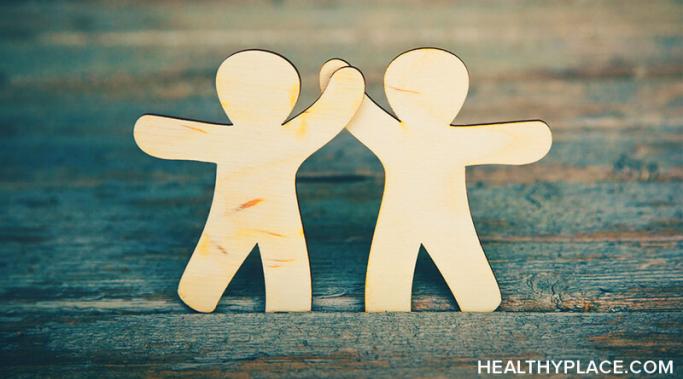Coping methods are personal choices, so I'm going to come out and say it: people need to stop criticizing others for how they cope with mental illness. As long as the coping methods aren't hurting the people who use them or others, I don't see the issue. Although I'm sure some are trying to joke around, when you ridicule the very tools people use to get through tough moments, it has a negative impact on those with mental illness and contributes to stigma.
Surviving Mental Health Stigma
Self-stigmatizing negative thoughts can work their way into your mind when you live with a mental illness. Learning how to deal with negative thoughts is one of the biggest learning curves there is. Personally, it's something that I still struggle with, too. When things become still and I'm left with myself, it gets loud in my head. The self-stigmatizing negative thoughts begin to incessantly drum away and it becomes challenging to deal with, but I do have helpful strategies.
People underestimate how powerful compassion is for getting through tough times. Sure, facing hard realities is a necessary part of recovery and tough love can be beneficial. But, ultimately, I believe it's the power of compassion that'll help us through the hardest moments and that it's the most beneficial to those with mental illness and their loved ones.
I tell my mental illness story with tattoos because they both tell stories and help us tell our stories. Those stories can be about anything, and countless people have gotten their skin permanently marked with representations of their journeys with mental illness, myself included. My tattoos give me the opportunity to share my mental illness story and talk about mental health in general. Most conversations are positive, but as with most things mental illness-related, stigma is never too far off.
If I were to ask you to picture someone who is experiencing suicidal thoughts, what would you imagine? My guess is someone wearing dark clothes with a haggard expression and overall looking like he or she are down on his or her luck. The image of someone who seems to have it all together might not come to mind at all. But, like mental illness, suicidal thoughts aren't reserved only for those whose circumstances "warrant" it. Suicidal ideation can and does affect anyone at any time, even when life is otherwise good.
It's not just those of us with mental illness who combat or want to combat mental health stigma. People in our support systems and others who may not have a connection to mental illness often want to do something as well. Maybe it's a matter of not knowing what to do or where to start, maybe it's something else. Whatever it is, if you fall into those categories, this post with tips to combat stigma is for you.
I'm guilty of discounting simple remedies for mental illness. I would always see something like changing a sleep pattern as simple in comparison to the complex nature of mental illness. I couldn't understand how one could truly make a difference on the other and saw people suggesting that it could as a gross misunderstanding of mental illness and ultimately a perpetuation of stigma. But sometimes the simple solutions are the ones we need to alleviate the symptoms and improve mental wellbeing, which is what I learned recently when I realized how much sleep affects my mental health.
When we talk about mental health often, we learn that we can deal with mental health stigma if it happens but it's not easy to talk about mental illness. Telling people about your mental illness makes it feel like you're inviting the world to blow up -- at least that's how it felt for me. I had such a long list of bad experiences and reactions to my mental illnesses, especially skin picking disorder, that it just seemed ludicrous to willingly tell somebody about them. Yet, repeatedly facing the potential of stigma both online and offline has taught me that the world won't end when I tell people I have mental illnesses and talk about mental health. And knowing that has made it easier to take on stigma every time.
I combat self-stigma with books about mental health because as much as I love the online world and the connections it's helped me make, there's something about a physical book that can't be beat. I often find myself looking for books when I want to read personal accounts of journeys with mental illness and health in general. It's not just about reading the stories though — I find I seek them out most when the noise in my head is too loud. Reading these kinds of stories actually helps me combat self-stigma drumming away in the back of my mind.
Many think of the bond between human and animal as a simple pet-owner or predator-prey relationship. For others, the connection is greater as service and support animals offer physical and mental assistance to humans. Yet, while many gaze upon service animals with respect, support animals are stigmatized as fake despite the help they offer people.









